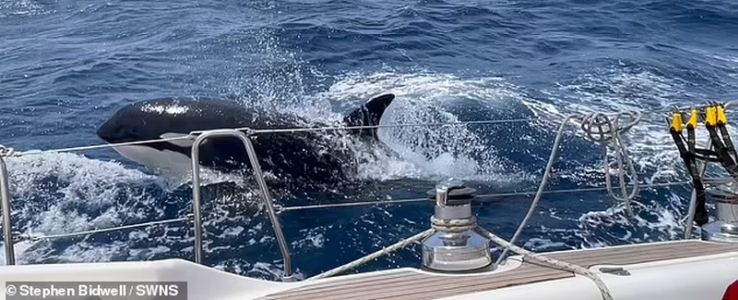 Orca attacks on sailboats off the Strait of Gibraltar and the Iberian Peninsula continue.
Orca attacks on sailboats off the Strait of Gibraltar and the Iberian Peninsula continue.
Janet Morris and Stephen Bidwell from Cambridge told The Sunday Times that on May 2, on the second day of training for their week-long sailing course off the coast of Morocco, they were attacked by a pod of orcas that bumped the hull and damaged the rudder and steering system of the 46-foot Bavaria yacht. Fortunately, no one was injured and the boat returned to port safely.
The Maritime Executive reports about a similar attack in early March. The crew of the sailboat Larios made a distress call and reported that their vessel was disabled off Cape Spartel, Morocco. They had come into contact with three orcas and had lost their rudder. Salvamar Maritimo dispatched the rescue boat Salvamar Arcturus from the port of Tarifa to give them assistance, and the Arcturus towed them all the way to Barbate for repairs.
Scientists have begun to be able to identify the individual whales involved in the attacks.
From reviewing video footage from the sailboat incidents and analyzing the scars on the orca’s bodies, marine scientists with research center CIRCE determined that three specific individuals are involved, all teenage males. Identified from research surveys as Gladis Black, Gladis White, and Gladis Gray, they all belong to the same family pod, and they appear to be engaging with sailboats as a form of entertainment.
“From what I’m seeing, it’s mainly two of those guys [the Gladises] in particular that are just going crazy,” marine biologist Dr. Renaud de Stephanis told the BBC. “They just play, play and play. . . . It just seems to be something they really like and that’s it.”
This is not the first time that the trio of Gladis orcas has attacked sailboats. In 2020 CSNews reports that scientists identified three killer whale culprits behind a spate of attacks on yachts off the coast of Spain and Portugal. In a two-month period, the orcas had ripped the rudders off fishing vessels and rammed pleasure yachts in 22 separate incidents off Galicia. By studying footage, the investigating experts implicated Black Gladis, White Gladis and Grey Gladis in 61 percent of these attacks. The whales were identified in part by the scars across their bodies which are believed to have been caused by their clashes with boats.
